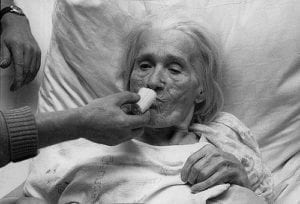What Causes Elder Abuse?


Other problems in elder abuse include personal problems occurring in the residents or among caregivers. There may also be societal, cultural and familial influences that make a difference in the care the elderly resident receives.
Caregivers, family members and the residents themselves should look for any evidence of elder abuse and potential issues that could have led to this abuse. It is important to understand how to recognize the warning signs of elder abuse in order to keep senior citizens safe.
Understaffing as a Cause of Elder Abuse
The understaffing of nursing facilities is a controversial topic. This issue has come to the attention of the media and consumers, particularly in recent years, due to the increase in rates of elder abuse and the effect this has on nursing home residents and facilities.
Some people have even come to refer to the understaffing of a nursing facility as being a crime. This is especially true when the managers of the facility understaff the nursing home intentionally to spend less money on caregiver wages, therefore maximizing their profits.
Neglect Due to Understaffing
The result of an understaffed nursing facility is often the neglect of its residents, and this neglect is a form of elder abuse. In situations of neglect, nursing home residents are likely to not receive the proper attention necessary to ensure their well-being and physical health.
This form of neglect can be devastating to the nursing facility residents — particularly those who are immobile or who have issues around movement. Understaffing that leads to neglect can be the cause of falls, bedsores, muscle atrophy and other injuries, all of which are preventable with proper staffing of the facility.
Abuse Due to Understaffing
When a nursing facility is understaffed, existing nursing home employees are more likely to have to work overtime to pick up the slack. This can cause excessive stress among the remaining staff members, which might encourage them to rush through tasks or skip important steps in care programs. As a result, an understaffed nursing facility is likely to have an increased risk of elder abuse among the residents.
This type of elder abuse can be both intentional and unintentional. However, elder abuse is often the result of nursing home staff members become distressed and inappropriately placing blame on the nursing home residents.
Personal Issues Among Caregivers
Personal issues taking place among the caregivers can affect the quantity and quality of care in nursing home settings, as well as in residential settings. Caregivers who have extreme psychological, financial and physical issues may take these problems out on the nursing home residents. This can affect the amount of time and assistance they give to the residents they are responsible for taking care of.
An example of this problem is a caregiver who has a drug addiction. They may start to steal medications from unsuspecting residents, resulting in the resident experiencing more pain or discomfort because they have not received the medication they are allotted by their doctor.
In addition, caregivers with extreme financial problems may abuse nursing facility residents by stealing from them or taking advantage of the personal assets and financial resources.
Common personal problems among caregivers that can lead to elder abuse include the following:
- Being under excessive stress due to chronic fatigue
- Having an overwhelming amount of daily responsibilities
- Suffering from illicit drug abuse, including the excessive use of alcohol
- Having psychological problems, including bipolar disorder and depressive symptoms
- Anxiousness related to limited financial resources
Understanding Caregiver Issues
When caregivers experience personal issues that create frustration and distress for them, they may feel inclined to take it out on the nursing home resident. It is critical to provide the resources that would allow caretakers to better manage their stress in a healthy way. Elder abuse can be prevented if nursing home managers have more of a focus on the needs of the caregiver.
If personal issues among caregivers are seen by family members, residents or co-workers, it should be discussed with the caregiver and any other appropriate personnel, such as the caregiver’s manager. In such cases, there may be assistance allotted to the caregiver so they can receive counseling or physical care that will allow them to feel better as well.
Cultural and Familial Differences
In some situations, the elderly person is abused or mistreated as a result of issues related to their own family or culture.
For example, some families and cultures place more of an importance on caring for the elderly person than others. As a result, there is usually less elder abuse among these communities. Abuse in the elderly is more common in cultures or families where the elderly person is seen as a burden or an unfruitful member of society.
Causes of Family Elder Abuse
Unfortunately, most cases of elder abuse extend from the family of the elderly person. In many instances, it is the family members who are the perpetrators of emotional, sexual, physical and financial abuses against the elderly relative.
This can be a particularly devastating form of abuse, as there is often a lack of accountability for others to detect the warning signs and help the family member receiving the abuse. Culture and differing family values can also play an important role in who gets abused and who doesn’t.


